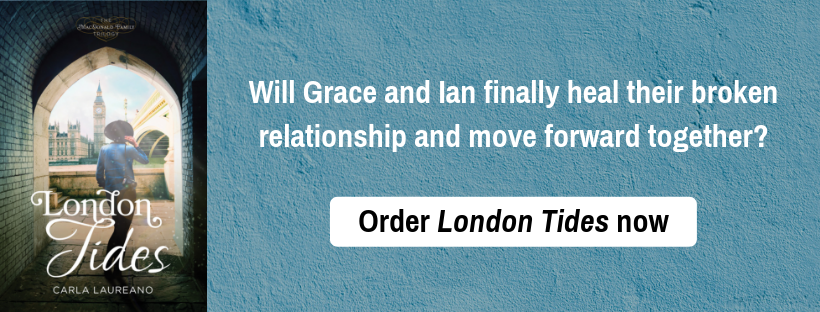As a former war photographer, Irish photojournalist Grace Brennan from Carla Laureano’s novel London Tides has witnessed a great deal of devastation. And in the aftermath of a tragic personal loss, Grace is reeling. Like Grace, to deal with trauma or loss, we may turn to unhealthy modes of coping with our pain. Read Carla Laureano’s article below to find some tips that may help you the next time you find yourself struggling to cope with stress or pain in your own life.
I often say that Grace Brennan from London Tides is my favorite female character of all the ones I’ve written, but she was also the most difficult. Because she was a war photographer suffering from PTSD, it was important to me that I portrayed her actions and her mental state accurately, and I’ve been told by readers whose loved ones deal with the disorder that I captured the struggles faithfully.
If you do have a diagnosed mental health condition or suspect you might, I encourage you to seek the help of a qualified professional who specializes in trauma. That said, we don’t have to be suffering from PTSD to learn from Grace’s journey. Daily life provides plenty of opportunity for grief, trauma, and anxiety that fall below the threshold of a psychiatric diagnosis but still affect our everyday lives. I lived for years with anxiety and chronic health conditions triggered by stress, and in many ways, I closely related to what Grace was going through.

What I—and Grace—found is that some things can help us deal with the stressors, both big and small, in our lives.
1) Don’t be ashamed. For most of us living in the Western world, we have very little to complain about. We have places to live, food to eat, and possessions to make our daily lives easier, often in more abundance than we actually need. So it can be easy to dismiss our problems with a pithy hashtag: #firstworldproblems. But just because our problems aren’t life-threatening doesn’t make them any less real. By refusing to acknowledge the things that bother us, whether they are small hurts or a major loss, we allow them to fester and grow.
2) Don’t hold it in. It can be tempting to keep the details of our struggles to ourselves, either because we think other people won’t understand or because we’re afraid to be seen as weak. But holding in negative emotions rarely makes them go away; it just allows them to multiply. When we’re in pain, it becomes increasingly more difficult to keep things in perspective and make good decisions. Whether you speak with a friend, a spouse, or a mental health professional, make sure that you open up to someone you trust. Only when we let negative emotions out do we have room to let positive ones in.
3) Don’t neglect the Word. Often when I’m going through something difficult or traumatic, the first thing to go is my quiet time with the Lord. I find it difficult to relate to the out-of-context verses that other Christians throw out when they don’t know what else to say; they can feel more like platitudes than real help. That’s when I dive into the books that speak to suffering in a real, visceral way, like Job and Psalms. Of all the characters in the Bible, Job and King David truly know what it is to have problems that can’t be solved with a pithy saying. The believers in these books don’t sweep suffering under the rug with the idea that real Christians would simply “consider it all joy.” They wrestle with God, display true pain, and eventually find peace in God’s sovereignty and comfort.
4) Don’t neglect the physical. Just like we shouldn’t ignore our spiritual lives when we’re grieving or disappointed, we can’t forget the physical. Our bodies are more intricately entwined with our minds and spirits than we like to believe, and while there often isn’t a sole physical cause to our problems, there’s often a physical or medical component to our mental states. When I went through a period of extreme anxiety, I didn’t have the capacity to talk to others about my problems or even bring them to God. It wasn’t until I addressed the elements of my diet and everyday routine that were exacerbating my physical symptoms that I could truly deal with the mental and spiritual components. There’s a reason why James 2:16 (NIV) says, “If one of you says to them, ‘Go in peace; keep warm and well fed,’ but does nothing about their physical needs, what good is it?” The Bible recognizes that before we can deal with our minds and souls, we must address our bodies.
While these four points can’t immediately erase the pain, grief, and disappointments of this life, they can give us tools to move toward healing in healthy and productive ways. However, sometimes thoughts and emotions can be too much to handle on your own. If you are contemplating self-harm, please follow Grace’s example and seek out a qualified mental health professional or contact the National Suicide Prevention Lifeline at 1-800-273-8255.

London Tides by Carla Laureano
Irish photojournalist Grace Brennan travels the world’s war zones documenting the helpless and forgotten. After the death of her friend and colleague, Grace is shaken.
She returns to London hoping to rekindle the spark with the only man she ever loved—Scottish businessman Ian MacDonald. But he gave up his championship rowing career and dreams of Olympic gold years ago for Grace . . . only for her to choose photography over him. Will life’s tides bring them back together . . . or tear them apart for good this time?


